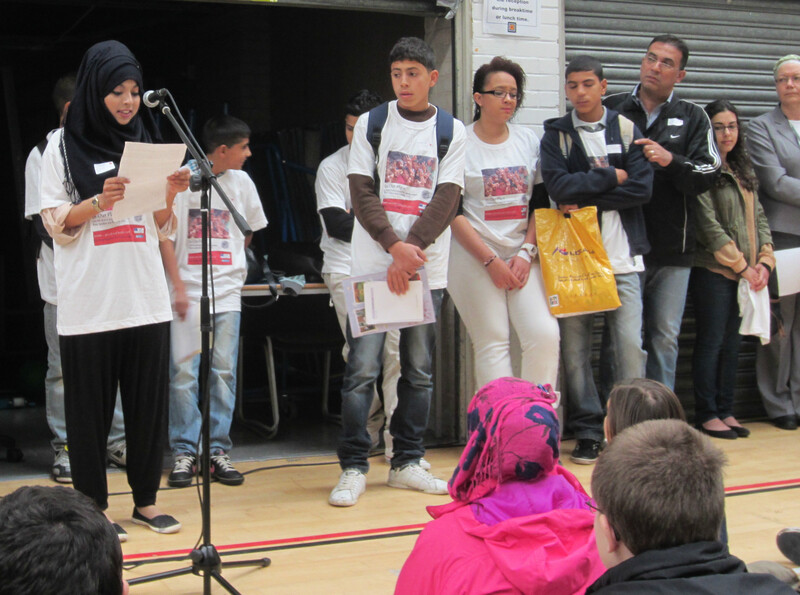The Electronic Intifada London 6 August 2012

Palestinian and UK students at a school assembly event. (Photo courtesy of CADFA)
It was a warm summer evening in an East London public library. Local people, including two councilors from the suburb of Hackney, have packed a room to meet visiting Palestinian school children. Organized by a local twinning group with the help of the Camden Abu Dis Friendship Association (CADFA), the event was an example of the type of modest activism that can be easy to miss.
The organizers behind such efforts often have to overcome serious obstacles for their Palestinian visitors to reach their destination. These obstacles come from the Israelis and sometimes the UK Border Agency.
At Dalston’s CLR James Library on 12 July, two Palestinian schoolchildren came with their English teacher from Beit Surik, a village near Jerusalem. To a packed room, Asma Badwan, aged 21 and a mother of two, gave a short presentation about life behind Israel’s wall in the West Bank. She talked about how half the village’s land has been annexed behind the wall and about the Israeli permits system that governs their lives.
Badwan is from Biddu, another nearby village, but teaches at a Beit Surik school. To travel from Beit Surik to the nearby town of al-Ram used to take only a five-minute drive, she said, but since Israel built the wall, the same journey takes about two hours. Al-Ram is now on the “Israeli side” of the wall.
Wisdom beyond her years
As part of CADFA’s school exchange program, Badwan’s pupils Yara and Marram had been paired up with “buddies” from local schools, who showed them around London. They also took part in presentations at local schools.
At the library, their buddies gave a historical presentation on the origins of the Zionist colonization of Palestine, and the current Israeli system of apartheid.
Badwan and her two pupils then had a chance to answer questions from the audience. The questions were many, and the discussion was lively. One person asked: what can be done, apart from boycotting Israeli goods? Badwan emphasized that there needed to be more education in the UK about Palestine. When the Palestinian guests had visited local schools, some of the British children asked where Palestine was, or confused it with Pakistan.
With a wisdom beyond her years, Yara emphasized Britain’s historical responsibility for the Israeli takeover of Palestine. Speaking through a translator, she said that more should be done to educate and to raise the issue with British politicians.
Obstacles
Such Palestinian visitors to the UK, of course, face many obstacles from Israel. The racist permits and checkpoints regime makes flying from the main Israeli airport, Ben Gurion International, out of the question for most Palestinians. Most must take the arduous journey through Israeli checkpoints into Jordan, flying to their ultimate destination from Amman.
And then there is the UK Border Agency. The Conservative-led coalition government is known for cracking down on the number of “foreigners” visiting the UK, often accusing them of wanting to overstay their visas and claim asylum. In this climate, even visitors’ visas can be hard to obtain.
At the end of July, a group of Palestinian children from Shatila refugee camp in Lebanon had their British visas denied, despite how their visit to the North-East had already been paid for, local papers reported. The trip had been organized by the Shatila Theatre Trust.
After the intervention of local Member of Parliament Alan Campbell (a former government minister), the British embassy in Beirut relented. But this reversal came too late for the group to catch their original flights. Organizers are hoping the visit will still go ahead, with rebooked flights (“Green light for refugee kids to visit the North East,” ChronicleLive, 27 July 2012).
Seven summers
But CADFA director Nandita Dowson told The Electronic Intifada that the charity had only suffered from one such incident since its inception in 2006. In that instance, about ten schools then rallied round and wrote letters to the UK Border Agency in support of the visit, and it was allowed to proceed.
Registering as a charity has likely helped boost CADFA’s reputation, building it up within local communities. “We’ve now got the respect of the schools here,” Dowson said, pointing out that local authorities even allow pupils six days off from regular classes to participate in CADFA activities.
Palestinian schoolchildren come here, and British schoolchildren and teachers go to Palestine. For seven consecutive summers, children have been brought over from Palestine. The focus is educational, with the English kids learning first-hand. The children go to events together and have “amazing conversations.” At one Wiltshire camping trip during this soggy-wet English summer, the kids came back as “ambassadors for the Palestinians,” she said.
Perhaps the main strength of such low-key, unglamorous projects is that they involve people beyond the usual activist suspects. By “always reaching new people,” as Dowson puts it, they help raise awareness about Palestine at a local level.
Asa Winstanley is a journalist from London who has lived and worked in occupied Palestine. His website is: www.winstanleys.org.



